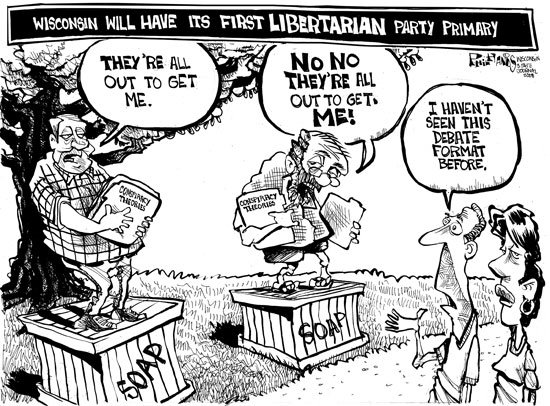 A misanthrope is one who has a general hatred, distrust or disdain of the human species. There are all kinds of reasons why someone might become a misanthrope. Many of those reasons are irrational and/or based on highly subjective, personal experience rather than on rational principles or scientifically defensible facts.
A misanthrope is one who has a general hatred, distrust or disdain of the human species. There are all kinds of reasons why someone might become a misanthrope. Many of those reasons are irrational and/or based on highly subjective, personal experience rather than on rational principles or scientifically defensible facts.

Plan of the area of Midsummer Common designated under the Anti-Social behaviour act. Designated Area Hatched (Grey). (Photo credit: Wikipedia)
I am a pro-social, humanistic, tolerant, and generally broad-minded sort of person. Nevertheless I am also a reluctant misanthrope for reasons I think are not only rational but possibly even logically inescapable. There is scientific justification for my arguments, but I’d rather save supporting evidence for another time and just present the basic outlines of my case against humanity here:
Basic Arguments
1. Humans can be sorted into three broad behavioral categories or bio-psycho-social phenotypes that are established through the interplay of nature and nurture:
- strongly pro-social (SPS) (empathetic, altruistic, egalitarian, democratic)
- strongly anti-social (SAS) (aggressive, predatory, authoritarian sociopaths)
- omni-social (OS) (mixed behavior that can vary widely in degree and/or frequency between pro-social and anti-social depending on situation and context)
2. In the USA nowadays our population is divided between the main behavioral phenotypes (SPS, SAS, and OS) roughly in these proportions:
SAS (10%) |<——>|<—————————- OS (70%) —————————->|<————->| SPS (20%)
3. People in all three types can be highly intelligent, creative, resourceful, and competent but for convenience I’ll characterize the strongly anti-socials (SAS) as “the wolves;” the omni-socials (OS) as “the sheep;” and the strongly pro-socials (SPS) as “the cats.” Wolves, although they are anti-social towards the other two categories, often act in large, well-organized, hierarchical packs. Sheep operate in herds of many sizes, shapes, and types and form various kinds of relations with wolves and cats.
Cats tend to be intelligent, creative, liberal, and progressive but they also tend to be idealistic to a fault and to have big egos. This leads to conflicts among themselves over relatively minor differences. They have many core values and beliefs in common, but they have difficulty pulling together and synchronizing their political and economic actions. While paying very pious lip service to the common good, they tend to place things like creative autonomy, self-actualization, personal enlightenment, etc. (i.e. being “mavericky” free thinkers) far ahead of intellectual, political, and social norms which they may even find repugnant and confining (even if those norms are highly utilitarian and pro-social).
Cats have a broad spectrum of ideological specializations (competing “boutique” ideologies) that tend to keep further splintering into smaller and smaller factions. Examples (to mention only a few) include relatively mainstream classical liberals, progressives, leftists, socialists, trade unionists, etc., as well as:
- Anarcho-capitalist
- Anarcho-syndicalist
- Buddhist
- Collectivist
- Communist
- Cooperativist
- Democratic socialist
- Egoist
- Existentialist
- Feminist
- Green
- Individualist
- Infoanarchism
- Insurrectionary
- Left-libertarian
- Magonist
- Mutualist
- Naturist
- Natural capitalist
- Pacifist
- Platformist
- Post-anarchist
- Post-colonial
- Post-left
- Primitivist
- Queer
- Social
- Syndicalist
- Synthesist
- Universalist
- Vegan
 A similar degree of political and socioeconomic fragmentation is produced as cats follow their individual artistic muses, social and cultural preferences, career paths, etc. We are addicted to our mavericky idiosyncrasies. They make us feel special, superior, and they stimulate the endogenous neurochemical intoxicants to which we are addicted. As “cultural creative” types we preach collective consciousness and the common welfare but in fact we are more often occupied with distinguishing ourselves, “going our own way,” etc. than in harnessing ourselves to pragmatic social standards or norms no matter how universal.
A similar degree of political and socioeconomic fragmentation is produced as cats follow their individual artistic muses, social and cultural preferences, career paths, etc. We are addicted to our mavericky idiosyncrasies. They make us feel special, superior, and they stimulate the endogenous neurochemical intoxicants to which we are addicted. As “cultural creative” types we preach collective consciousness and the common welfare but in fact we are more often occupied with distinguishing ourselves, “going our own way,” etc. than in harnessing ourselves to pragmatic social standards or norms no matter how universal.
The collective forest (our ethical common ground, our commons of basic enlightenment values, standards, and norms) is often lost for all our diverse intellectual, political, and social trees and branches. In this regard, in our ego-stimulating self conceits, we are just as bad as (perhaps worse than) the wolves and the sheep.
4. In the end our fierce, creative independence; our idealism; and our social conscience all fail us. The wolves use corporate media, public relations, legal and political influence, shiny consumer objects, wages and salaries, etc. to exploit the obsessive-compulsive, narcissistic, and self-indulgent aspect of a cat’s nature. They keep us chasing laser pointers and toys on strings– and thereby they divide and rule even the most fiercely independent cats.
5. But its not the wolves and sheep that I’m most disappointed in. It isn’t the predictably predetory behavior of wolves; or the foolish, irrational behavior of sheep (driven by instincts, emotions, and unconscious calculations of self interest) that makes me a reluctant misanthrope. I’m most disappointed– no, disgusted– at we cats. We artfully avoid coming to grips with the widening gap between 1) our hopes and ideals for civilization and the planet, and 2) our actual collective accomplishments as cats. Despite progress in certain areas of social and cultural development, if we take honest stock of the big picture we find that civilization has moved closer to disaster and dystopia in our generation, on our watch. Our institutions are increasingly helpless to cope with trends like peak oil, peak minerals, peak food, peak water, peak habitat, peak biodiversity, peak equality, peak justice, etc. Despite the fact that fairly obvious (often empirically proven) solutions to these problems have been around for decades we seem helpless to turn the ship of civilization far enough and fast enough in the right direction. Why? Our usual answer is that we are outnumbered and overpowered by the wolves and the large percentage of sheep they control.
The real answer is that we are outmaneuvered and outplayed. As 20% of the population (and in many ways the most enlightened and resourceful 20%) the 60 million or so of US cats might have the potential and the means to turn civilization on a dime if we played the game a certain way.
We are, after all, each trying to put his or her best foot forward–it just isn’t the same foot at the same time making the same size step in the same direction. Despite the fact that most cats are all pulling in a progressive general direction, our timing, our exact compass bearing, and our precise quanta of effort are all over the place. Cats are not synchronized swimmers. We’re more like drunken sailors. Nevertheless, 60 million cats pulling in unison as one virtual tugboat probably could move the ship of civilization in any direction we chose. The problem is not insufficient means–it is inadequate method. The problem is entirely one of coordination. A virtual machine made up of sixty million cats acting in their historically default manner has no functional command and control system. Cats aren’t like ants or bees who stigmergically act in concert. Sheep are a lot like that but cats are (if anything) just the opposite. Throw a stone at a group of cats and each will bolt off in a different direction. We can’t hold a virtual tugboat of cats together for very long, much less steer a coherent course, unless we do something different– say invent a new set of cat-compatible social design and engineering methods with empirical quality controls. Otherwise, any virtual tugboat made of cats will immediately begin to fall apart as it runs in erratic circles and zigzags. It is on us– if we don’t alter our historically typical cat nature the wolves and sheep will keep pulling us towards the edge of the world. If we do alter ourselves in whatever way necessary to act both rationally and in concert we might well be able to alter that course. In order to succeed, cats must be able and (more importantly) willing to see ourselves as we truly are–creatures of ego, vanity, and self-indulgence. Yet typically we look in the mirror of our mind’s eye and imagine ourselves as beings of enlightenment and high moral sensibility. Of all creatures I think we cats have the greatest potential ability to see ourselves as we truly are–but do we have the courage and the will to submit to such mental and emotional self-discipline? Each of us is by nature already willing to endure great suffering and sacrifice in order to pursue his or her own personal heroic, idealistic, and esthetic narratives. But are we willing to endure equal suffering in the service of a collective norm, a standard narrative with measurable objectives and rigorously empirical quality controls? That’s not normally, naturally, or historically how we roll– which is why I’m currently a reluctant misanthrope. Can that change?
There are hundreds of good pro-social plans, solutions, projects, organizations, movements, tactics, etc. We each have our favorites. But are there any two or three of those that all 60 million of us will commit to act upon in some measurable way (say by contributing ten dollars or ten hours per month)? If so–if that would happen–then those efforts would probably succeed and ALL the other pro-social, progressive projects (including your own pet projects) might follow like dominoes.
My suggestion for a simple, initial, common agenda for the 60 million most pro-social humans in the USA:
1. Organize into 12-member consciousness-raising circles or juntos (clubs) to meet physically in person at least once a month. These clubs would network with each other to form bioregional, national, and international networks. This club of clubs would operate democratically and follow the principle of subsidiarity (i.e. any matter should be handled by the smallest, lowest, or least centralised agency or authority capable of addressing that matter effectively). The core theme of “consciousness-raising” spans all pro-social agendas, organizations, projects, etc. but also specifically focuses on developing real cognitive and metacognitive group practices.
2. Also contribute time and/or money on a regular monthly basis to the occupy (OWS) movement and your local Democratic Party organization.
Are you as disappointed in the overall net accomplishments of your generation (and yourself) as I am?
Is individual and collective effort of a different quality and different order of magnitude possible?
I don’t think adequate consciousness-raising is very likely, but I do think its possible.
Your reluctant misanthrope,
Poor Richard
Related PRA 2.0 posts
- Social evolution: An ounce of allegory vs a pound of theory
- A profound irony (What a piece of work is man)
- AHA! A 12-step program for positive cognitive hygiene
- The Meaning of Life
Related articles
- Moving beyond homo economicus (japantimes.co.jp)
- being a sociopath (thejohnsmithblog.wordpress.com)
- How This Culture Makes Addicts of Us All (and Why That’s OK) by Dave Pollard (howtosavetheworld.ca)
- How to Think by Chris Hedges (truthdig.com)
Related video
Davey D sits down with hip-hop historian, technologist, & entrepreneur, Lasana Hotep. They talk about the difference of how technology is utilized in urban communities compared to predominately white suburban communities and the paradigm shifts that encompass them. (OLMNews w/ Davey D)
























 Church of Reality
Church of Reality Critiques Of Libertarianism
Critiques Of Libertarianism P2P Foundation
P2P Foundation Stanford Encyclopedia of Philosophy
Stanford Encyclopedia of Philosophy The Stone
The Stone